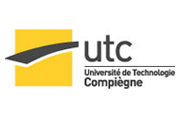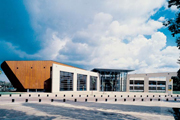Université Technologique de Compiegne : Computer Engineering section
Centre Pierre Guillaumat
rue du docteur schweitzer
60200 Compiègne, FRANCE
Tel : 03.44.23.73.90
Coordonnées GPS : 49'24'00.98'' N / 2'47'59.19'' E
Spring 10 Semester - GI04
- MT12: Mathematical techniques for engineers
Short description :An engineer must know, understand and use without any difficulties some apparently difficult mathematics objects. That's the Point of the course. The analysis and synthesis also called deconstruction-reconstruction with the using of transform is the origin of several sciences model. For instance, we know that the statistic point of view is most of the time a pertinent one to analyse data. It's the same with the frequency point of view, which is developed in this course.
Key words : Lebesgue integral, distribution, convolution, Fourier series, Fourier transform, Laplace transform, wavelet transform. - SY09: Data analysis and data mining
Short description :In many industrial and economic fields, the multiplication of information to be taken into account requires the development and the use of techniques allowing to extract useful knowledge from it. To make the good decisions, the persons in charge must be able to apprehend and use indeed all these information. Analysis of multidimensional data and in particular data mining which seeks to transform the raw data into more structured knowledge provide tools adapted to this type of problem.
Program :
- Introduction: examples of problem of prediction; supervised and unsupervised training;
- Multidimensional statistics: random vectors and descriptive statistics;
- Geometrical representations of the data;
- Principal component analysis;
- Factorial discriminant analysis;
- Clustering : k-means algorithm and agglomerative hierarchical clustering algorithm of Ward;
- Mixture model and clustering;
- Mixture model and clustering;
- Kohonen's Self-Organizing Map;
- Methods of regression. - SR03: Programming internet application
Short description : The course presents architectural aspects of main Internet technologies : TCP/IP, socket interface, RPC, distributed objects (Java-RMI, Servlets, JSP, Corba), XML/XSLT, XMLRPC and applications servers (J2EE)
Key words : Recalls architectures and protocols Networks Web, HTTP, CSS, JavaScript, CGI and PHP The Java system, Java RMI, Java Progamming JEE Servlets and JSP Spring, Struts, etc. Corba XML and XSLT XML-RPC, XML Web Services and the Internet, Internet Application Servers, Java Application Servers, ZOPE PVM Case study. - NF28: Interactive Systems Engineering
Short description : This credit presents methods and tools for the design, implementation and evaluation of interactive systems. Mainly focused on classical WIMP (Windows, Icons, Menus and Pointing device) interfaces, it also treats of advanced computer human interaction forms (multimodality, computer supported collaborative work, virtual reality, ...). Graphical user interfaces development is based on Java, and more precisely on the Swing API.
Key words : Multimodality, Groupware, Portable Digital Assistants, Virtual Reality. - LA20: Spanish initiation
Short description : This course is designed for students wishing to begin learning Spanish. It will enable them to acquire an elementary level of linguistic knowledge as well as basic cultural notions. A series of interviews gives students the tools to communicate in everyday life situations. - LG30: Japanese initiation
Short description : Initiation into the Japanese language and culture. Works from the Japanese + magazine "Nihongo Janaru" in the BUTC ; Japanese films in the language center. - TX: Laboratory project
Short description : This unit gives to students an opportunity to learn how to address tangible problem, prospective problems, technological problems and or economical problems. The learning of critical analysis method should give students, in close relationship with a research team or an industrial team, an opportunity to propose original or innovative solutions to a specific problem. To pass this unit, the main goal and the quality of the project must be approved at the beggining and the end of the semester by a UV TX jury. All projects requires an exhaustive written paper and an oral presentation in front of at least 2 persons including the project manager. Exhaustive written paper and an oral presentation of the results.
My Subject : Evaluate the 3D engine into virtual reality application within creating an interface with the following devices :
- Stereoscopic screen.
- 3D capture system.
- WiiMote.
- Etc.
It'll be needed to create extensions with the following purpose:
- Stereoscopic display.
- Creating of a VRPN client (Virtual-Reality Peripheral Network : www.vrpn.org).
- Immersive room extension.
Spring 08 Semester - GI02
- LO11: Programming theory and practical
Short description :The UV provides the OOP fundamental principles : encapsulation, secure, data abstraction, class, interface. The mechanisms of inheritance are discussed in detail (link at runtime, polymorphism). C++ with UML.
Key words : Object-oriented programming (C++ and Java), abstract data structures, complexity, program evidence. - NF17: Data bases design
Short description : This course objective is to teach students how to design relational and object-relational databases. In order to achieve this objective, the students will develop methodological skills for conceptual and logical modelling, as well as technological skills toward typical DBMS and toward usually used languages.
Key words : Database, conceptual model, relational, SQL, object, transaction, web, dbms. - SR02: Operating system : from concepts to programming
Short description : First part: fundamentals of operating systems Second part: internal mechanisms (interrupts, virtual memory, OS-hardware interaction, interaction between processes...)
Key words : Mutual exclusion, inter bottlenecks, system calls, interrupts, management I/O, virtual memory, graphic interface. - IA02: Problem solving and logic programming
Short description : The considered approach, fitted for the complex problems with a strong combinatory characteristic, proposes to use methods which builds a solution when solving these problems. These methods are based on the representation of knowledge and on research technics. Then the formal logic plays an essential part, especially for expressing and validating the reasonnings. Furthermore, this course presents the main principles of logical programming.
Key words : Predicated calculus, logical representation, automatic proving, heuristics, research in a states space, games theory. - MT10: Structures, algorithms and computer algebra
Short description : An engineer has long been developing numerical methods. Henceforth, it can also be implemented computing and formal methods. The purpose of the UV is to introduce the fundamental structures, to introduce effective methods of algebra and apply it to different situations using the MuPAD. This also allows uv parallel to complete a scientific basis.
Key words : algebra, arithmetic, polynomials, cryptography, databases groebner, complexity. - GE15: Basis in business management
Short description : This UV gives bases necessary for the understanding of the functioning of a company and a role of the global management to insure the development of new products and the perpetuity of the company. Any development of product or any action aiming at maintaining the activity of a company should take into account marketing elements, production, human resources and finances.
Key words : Business Plan, competitive environment, the prospects, the marketing mix, industrial property, teams, management, human resources, legal status, finances, breakeven point, the earnings report, the intermediate sale of management, the accounting balance, tables of finance, ratios of financial analysis. - TN15: Creation of activity, product, company
Short description : Short description : This UV allows to the students to dedicate itself to the study of the development of new products, either for their own account, or in narrow relation with bearers of projects or companies recently created. They will thus approach concretely the creation of new products and/or company on a context of realization of real mission with negotiated objectives.
Key words : Innovation, development, new products, study, bearers of projects, collaboration, marketing of products, technology watch, industrial property, management of the project of development, financial analysis. - LB13: Practical English - B2+
Short description : This LB13 course represents the practical level of English which must be achieved to obtain the U.T.C. engineering diploma. Intensive training in the four language skills (oral and written comprehension, oral and written expression) is required.
Key words : communicative approach - contextual analysis of grammar - emphasis on both fluency and accuracy - autonomy - self-correction.
Automn 08 Semester - GI01
- NF16: Algorithm and data structures
Short description : Introduction of the basic data structures and of the basic algorithms that manage them.
Key words : C programming, data structures, algorithms, complexity, files, algorithmic technics, data management, system. - IA01: Artificial Intelligence
Short description : The UV enables students: (1) to learn notions and techniques of Artificial Intelligence, (2) to be familiar with symbolic programming of fonctional type. Notions and techniques will be presented from applications developed with language LISP
Key words : Symbolic programming, artificial intelligence, knowledge representation, reasoning, Symbolic Representation, Lisp Programming, Production System, Expert Systems, Knowledge Representation, Object Representation Matching/Unification, Case Based Reasoning, Multi-agents Systems, Uncertainty in Knowledge Systems, Genetic algotithms, Artificial Neural Networks. - SY02: Statistical methods for research and manufacturing
Short description : Basic concepts and methods of Statistics useful for engineers. The goal of this course is to familiarize the students with the concepts and the mode of reasoning of the inferential statistics and to form it with the main methods of basic statistics, in particular in the three important applications that are point estimation, construction of the confidence intervals and hypothesis testing.
Key words : Descriptive statistics, probability space, random variables, main probability distibutions, stochastic convergence sampling, sample variance, likelihood, estimation, qualities, maximum-likelihood, method of moments, confidence intervals, hypothesis testing Goodness-of-fit tests, Chi-Square test, Kolmogorov test, analysis of variance, dispersion, prediction. - MT11: Problem solving and logic programming
Short description : This course is intended for students entering the third year of studies of the UTC after two years of technical oriented studies.
Key words : Analysis, geometry, algebra, vector analysis, curvilinear-double-triple-surface integral, complex number, matrix, differential equations, partial derivative. - GE37: Project management
Short description :
Key words : Business Plan, competitive environment, process-based management, planning and design, executing, monitoring and controlling, PERT-based models, GANTT charts. - GE27: Creation of activity, product, company
Short description : The course aims to provide the students with knowledge on : accounting principles and description financial statements, financial analysis and financing, investment criteria and budgeting method, cash flow from operating, financing and investing activities.
Key words : Budgets, cash flow, income, intermediate management balances, balance sheet, working capital, profitability, updating. - LA12: Intermediate English - B1
Short description : The course combines group sessions based on a system of projects, which allow the students to develop their skills in oral and written comprehension and expression, and to revise basic grammar, with interviews during which students express their ideas on themes linked to professional life in Enlish-speaking countries.
Key words : Online exchanges, intermediate English, oral English, projects.


